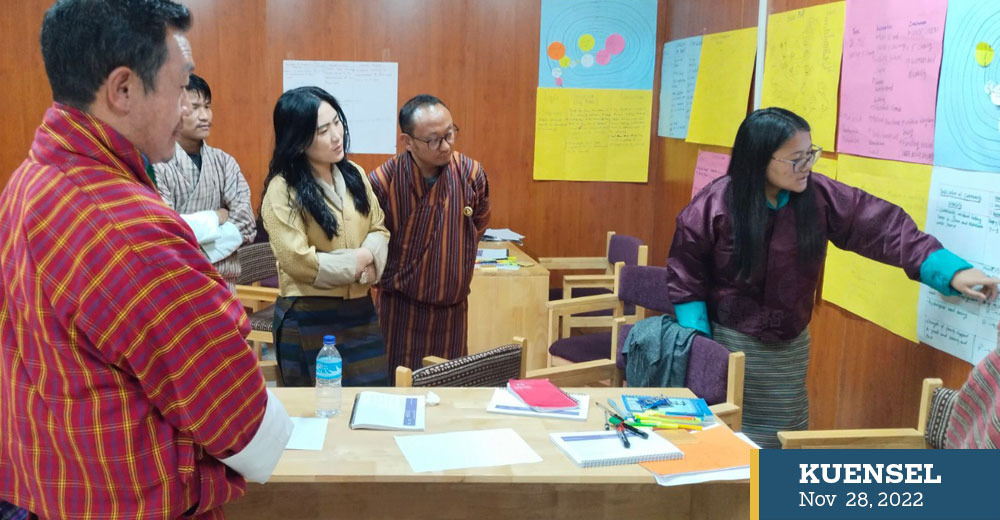Lumang and Merak gewogs are identified as pilot gewogs in the east
Neten Dorji | Kanglung
Local leaders and their staff were trained on how to be democratic, inclusive and consultative in conducting public consultations for planning and decision-making in a five-day workshop at Kanglung, Trashigang which ended on November 26.
The participants participated in a series of capacity-building workshops and developed plans using the Gross National Happiness (GNH)-based planning toolkit formulated by the Bhutan Centre for Media and Democracy (BCMD).
The initiative was undertaken with the aim to strengthen decentralised planning processes through citizen participation and evidence-based decision-making.
The workshop initiated a platform for local leaders to discuss views on the implementation of GNH-based community analysis and planning. They were also made to present jointly prepared community development plans, situation assessment and identification, prioritisation, decision-making, and implementation.
A programme officer of BCMD, Namgyel Wangchuk said that consultations and decision-making are made exclusively by the heads of the family and that planning begins not with the analysis of the needs and data but with prioritisation of activities driven by the budget, and deliberation only with a few active individuals.
“The aim of this workshop is to find potential trainers who can help us carry out participatory planning tool kits to the grassroots level as we venture to eastern dzongkhag,” he said.
“The capacity building of local leaders is necessary where they always faced challenges in prioritising while planning,” said Namgyel Wangchuk.
He said democracy is beyond voting and strengthening citizen engagement through inclusive consultations, and participatory planning is important.
Many of them found the session on participatory planning to be an eye-opener as they understood that present consultation procedures used today have not changed much to make a successful transition to democracy.
“Earlier we invited only the heads of the family to public consultations. After attending BCMD’s training, I feel voices from women, youths, elderly people and people living with disabilities also needed to be consulted,” said Kinzang Choden, Kharphu-Kurchilo tshogpa of Lumang gewog.
She said the GNH development theory served as the foundation for all prioritised initiatives and planning for her chiwog.
Another participant, Thinley Zangmo said that inclusive participation in decision-making and planning is needed rather than hearing from a few heads of the village who are literate.
“I found the local leaders lack transparency and accountability since they never share or consult with the public,” she said. “If local leaders implement GNH-based community analysis and planning, the issues of women and youth problems can be heard by them.”
To encourage more women to participate, she said that women empowerment and awareness in the community are necessary.
Most of the participants highlighted that local leaders have to ensure development plans beyond infrastructures.
“Most of the community development plan’s priorities were on roads, constructions of community temples, clean drinking and irrigation water, and waste management, among others,” said a participant. “They hardly plan for the generation of employment and development of the local economy.”
She also said that using the GNH lens to analyse communities and plan based on the needs would vary from gewog to other dzongkhags.
Sharing his plan for his chiwog, Merak Khamae tshogpa, Tenzin Dorji said that earlier the gewog invited only heads of households for consultation meetings.
“After attending BCMD’s training, I feel women, youths, elderly people and people living with disabilities also need to be consulted while planning development activities,” he said.
He also said that the training helps them to prioritise the development activities in the chiwog.
Officials said that having carried out decentralisation through local government’s office in terms of political, administrative and financials, if they do not have the right tool, they will somehow circumvent corruption practices.
“Local leaders usually invite those who are literate where they share only their problems. For instance, if all males are present during meetings, they never share the problem of women. Even university graduates refuse to attend the meeting,” said an official.
He said, “People are never empowered and people are always on the receiving end. They lack consultation, co-creation, and diversity.”


